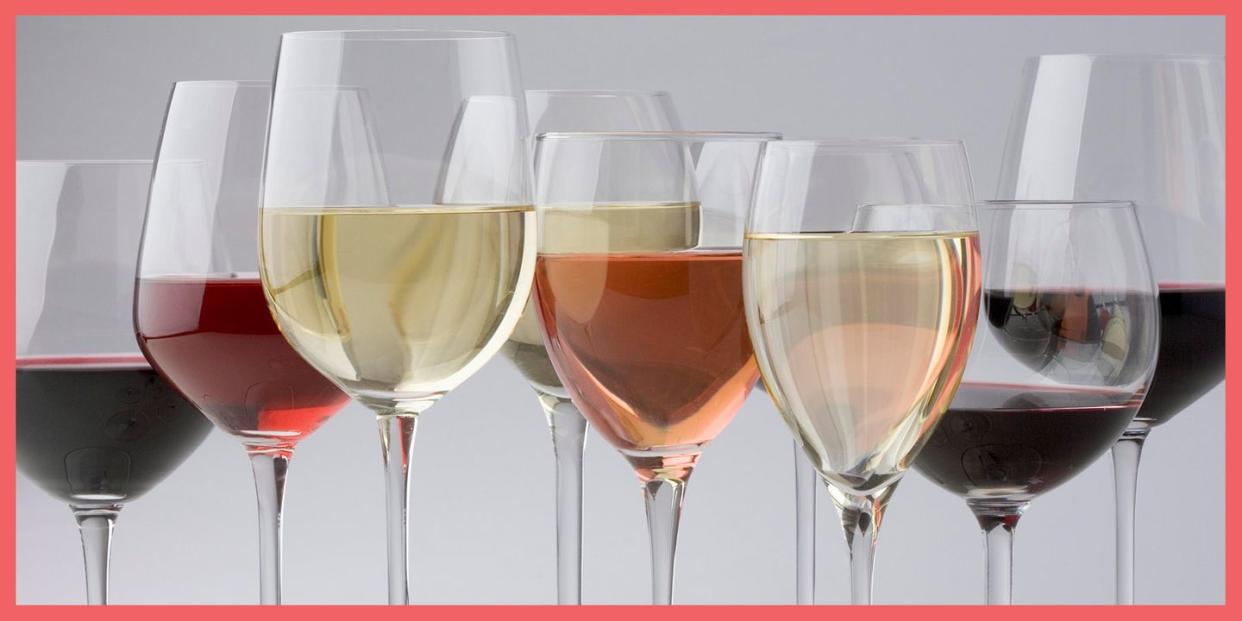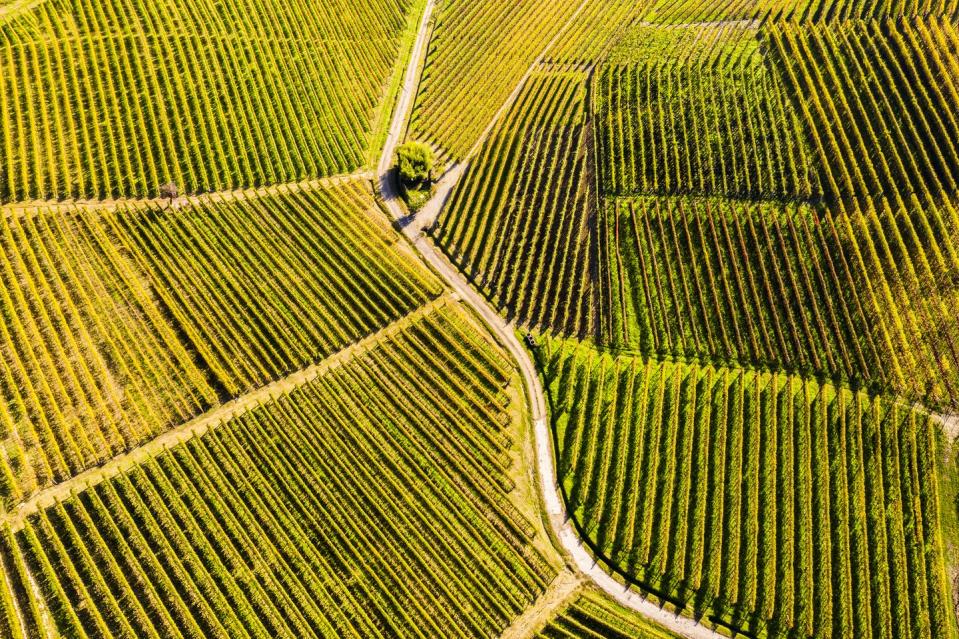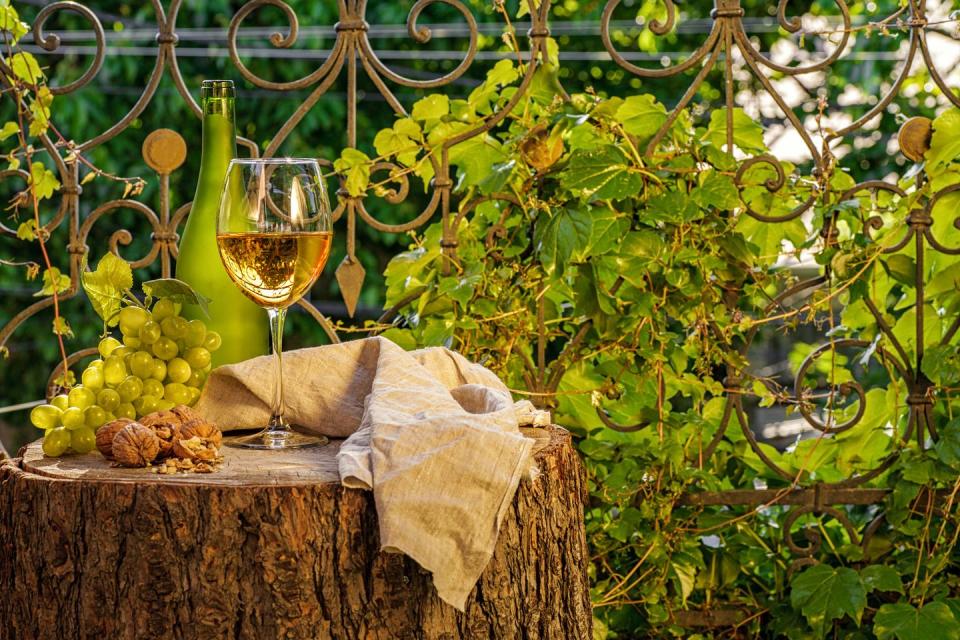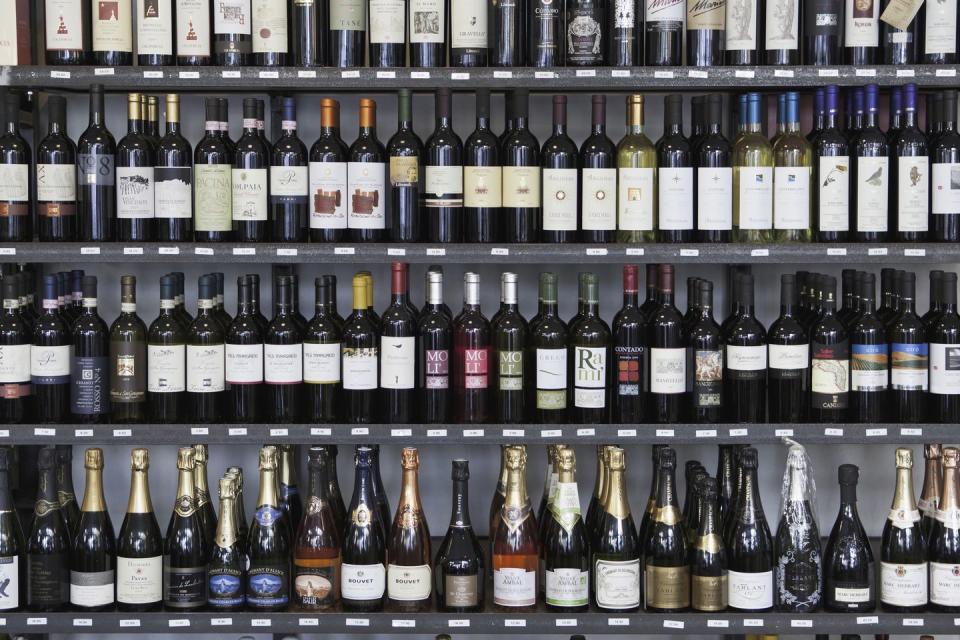What’s The Deal With Natural Wine? This Expert Gives Us All The Answers

Wine shops across the country are expanding their offerings to include more natural wine. If you buy wine often, you may have been seen words like "organic," "biodynamic," and "low-intervention" on bottles. But besides the aesthetically pleasing labels and vibrant hues inside the bottle, it's difficult to identify the real difference between natural wine and the standard wine you may be more used to sipping.
We chatted with Jack Brogan, sales representative at the New York-based natural wine distributor Super Glou, to demystify all of the misconceptions surrounding this trendy wine category.
Jump to:
What Is Natural Wine?
Natural Wine Benefits
Types Of Natural Wine
What Should You Look For When Buying Natural Wine?
Natural Wine Recommendations
What Is Natural Wine?
This question doesn't come with an easy answer. Just like with the word "natural" food-product labels, the term "natural wine" has no definitive meaning. It's primarily considered an umbrella category that encompasses many styles of winemaking that abide by a general principle of low intervention.
“Typically when we say minimal intervention, we mean low or no use of chemicals in the vineyards, no herbicides, no pesticides, little or no spraying of copper sulfates," Brogan says. "And in the winery there’s low or no use of sulfur and using only ambient yeasts [rather than inoculated yeast] to start fermentation. But everyone's checklist is a little different.”
Certain checklists meet the requirements for government-approved certification, like organic and biodynamic. But generally speaking, natural winemakers follow the philosophy of incorporating techniques from a time before the industry was industrialized for widespread distribution.
“It is the oldest form of winemaking. Some of the earliest recorded winemaking was in Georgia [the country] 6,000 years ago. They didn't have access to the pesticides and herbicides that we use today," Brogan says.

Natural Wine Benefits
If you've been introduced to natural wine before, you may have heard the claim that it's "healthier" for you and can even diminish the effects of a hangover. As much as we'd like for it to be true, it's sadly a myth. Even without extra additives and preservatives, it's still alcohol.
But that doesn't mean drinking natural wine comes without benefits—in fact, the production process allows the flavor of the grape to truly shine. Part of that comes from the minimal to no sulfur. The use of this compound in winemaking dates back to ancient Rome, but its widespread commercial application in wine began in earnest in the early 1900s.
On a practical level, sulfur is an antioxidant and an antiseptic that prevents "harmful" bacteria from proliferating in wine. But in excess, it can completely alter the wine's character.
“Lots of winemakers believe that over-sulfuring your wines doesn't just kill all of the bad bacteria—it kills the good parts of wine, too," says Brogan. "Wine has an aliveness and a personality, and if you over-sulfur it, you kind of box it in, in a way.”
Without the extra sulfur, yeast, and other additives, natural wine truly captures the terroir of where it comes from. The word, which literally translates to "soil," refers to all of the environmental factors that contribute to how the grape tastes. This can include the dirt, topography, and climate.
“Most of the time, lots of these natural winemakers have such a heavy focus on terroir that they are thinking about what has grown historically where they live, where they make wine, and they will use those," says Brogan. He argues that natural wine has "so much more to offer from a flavor standpoint."
Beyond the differences in flavor, the natural-wine industry also comes with environmental and ethical benefits. Unlike large commercial wineries whose bottles you can find at every wine store, natural winemakers typically run smaller operations with limited batches. And, since they avoid using industrial chemicals during the farming process, their environmental footprint is much smaller than those of large conventional vineyards.
"There’s more emphasis on the way they farm and how it impacts the environment, as well as the labor they use and how fairly they’re paid," says Brogan. "That ethos of natural wine spans beyond just what’s in the glass. It’s everything, every factor about where it comes from and how it’s made.”
Types Of Natural Wine
Identifying all of the types of natural wine is just as impossible as listing all of the conventional wine varieties. There is an infinite amount of ways to make wine, natural or otherwise. “Technically speaking, you can take any grape in the world and you can make natural wine out of it," says Brogan.
On the most basic level, you can find red, white, sparkling, and rosé wine that happens to be natural. But as you go from country to country, region to region, you can identify individual grape varietals that come with their own special qualities.
If you're somewhat familiar with natural wine already, you may be asking: "What's orange wine?" This trendy wine is, in fact, a type of white wine (and has nothing to do with the fruit). The vibrant hue comes from the process of maceration, which keeps the skins and seeds of white grapes in contact with the wine.

This technique may seem newfangled, but it's actually one of the oldest ways to make wine. In the country of Georgia, where some of the first recorded wines were made, orange wine is historically beloved. Now you can find types of macerated white wines all over the world.
"It's grown in popularity, as it's a more ancient technique. There's been a correlation between orange wine and natural wine because a lot of the natural wine in the U.S. that became very popular happens to be orange," says Brogan. "But orange wine is just one small piece of the natural wine pie.”
What Should You Look For When Buying Natural Wine?
Just like with conventional wine, you can't base the quality of the bottle on the label. The best way to learn more about natural wine and the varietals and winemakers you like is by doing research and tasting lots of wine. Utilizing online resources and talking to a wine seller or sommelier are also great ways to learn more.
Sometimes labels can be misleading. Some wineries capitalize on natural wine's popularity without employing its core values. “There are so many wines that are coming out that are marketed as ‘natural wine’ where their labor, farming, or winemaking practices should be under more scrutiny," says Brogan.
To avoid picking these bottles, he recommends looking at wine with a critical eye. “There are some wines that tick a lot of boxes: you have this wine, you seem to have a lot of it, it’s somehow all natural, and it’s cheap," Brogan explains. "Something doesn’t necessarily add up for some of these bottles. Labor is a logical place to look.”

On the flip side, many natural wine bottles are hiding in plain sight. Some of the most sought-after conventional wines happen to follow the same principles of low-intervention as natural winemakers do—just without the label.
“There is a lot of really beautifully made wine that markets itself as classic and conventional, but they're not using sulfur or other chemical additives and they're farming well.”
Despite this, many members of the conventional wine community look at natural wine with disdain. Some chalk it up to just being a short-lived fad, and that all the wines are too faulty, too funky, or generally inferior. Naturally, Brogan disagrees.
“I think that the line between natural wine and conventional wine isn't as stark as we think it is," he says. "Because there's lots of conventional wine that's really beautiful, and also lots of conventional wine that's really messed up. That’s the same no matter what style of wine you're drinking.”
The world of wine can be intimidating, especially if you're just starting to explore it. But when in doubt, just ask.
Natural Wine Recommendations
Before selecting a bottle of natural wine to drink, you may need to reconfigure your perspective. Because so much of the wine available on store shelves is from large-scale factory-style wineries, it's easy to assume that all wine is in abundance whenever.
"We've been taught to think that wine is something that’s available all the time whenever you want. In reality, it’s really a perennial product, especially with natural wine that's made in such small quantities," Brogan says. "Sometimes you will buy a bottle, you'll drink it, and you will never be able to drink it again. That’s the mystique and the beauty of it.”
With that being said, you can find wineries and distributors you trust to point you in the right direction. For bottle recommendations, check out these Sommelier-approved picks.
You Might Also Like

